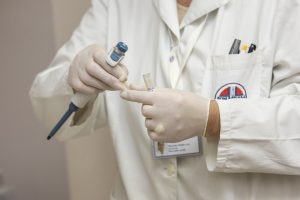
The main role of a medical assistant is to provide both administrative and clinical services, but in our article, we will focus on clinical medical aspirants who focus their skills on a specific area – that is clinical support.
Page Navigation
Who is the Clinical Medical Assistant?
A clinical medical assistant is a person who is in charge of patient care, and he/she does various tasks – from assisting doctors to collecting specimens for laboratory testing.
When compared to medical assistants in general, the job duties of a clinical medical assistant are based on the medical aspects of the practice, not on administrative tasks.
It is worth mentioning that depending on the type of setting they work in, clinical medical assistants’ duties may vary a lot.
Generally speaking, these are professionals who are educated and trained to support medical staff, who are not supposed to be licensed in most states, and who work only under the direct supervision of other medical professionals.
Clinical Medical Assistant Specializations
It is true that the duties of clinical medical assistants are numerous, and how busy they will depend on many factors.
If a facility is not large, they will have to perform various roles, but if they possess specialization, they will focus on their field.
So as to become specialized you will need to finish additional courses, but, when employed by specific healthcare providers, you will have advantages and you can expect higher wages.
Specialties of clinical medical assistants are:
- Podiatry medical assistants – He/she is a person who has specific knowledge related to feet care, so as to know how to treat a post-surgical condition or wound.
- Cardiology medical assistants – He/she is a professional who is familiar with how the cardiovascular system functions and they are supposed to conduct stress tests and EKG tests.
- Ophthalmology medical assistants must be able to perform diagnostic testing of the eyes or assist the physician in eye treatments.
- Chiropractic medical assistants – These professionals must be familiar with this medical treatment, and have knowledge of the therapies, including body manipulation, massage, and hot and cold therapy.
- Obstetrics/gynecology medical assistants – These assistants are there to assist the physician with every treatment. They are supposed to prepare women for their exams such as pap testing, breast exams, and minor gynecological surgeries.
Clinical Medical Assistants Job Responsibilities
You should have in mind that clinical medical assistants’ job duties vary according to the setting in which they work.
However, these are some of the most common tasks that clinical medical assistants are supposed to perform during the course of the day:
- Administer medications as directed by the physician
- Assisting the physician during the examination
- Authorize prescription refills
- Change dressings, sutures
- Collect and prepare laboratory specimens
- Draw blood
- Educate patients on medications, special diets, and other physician-ordered instructions
- Explain treatment procedures to patients
- Perform basic laboratory tests
- Prepare patients for examination
- Record vital signs
- Sterilize medical instruments
- Take patient information and medical histories
Qualities of Clinical Medical Assistants
First and foremost, the possessing of clinical skills is taken as a must when medical assistants are in question.
To successfully perform their jobs, they must also have some personal qualities.
Being a good listener, and having good communication with the patients and other medical staff makes you an ideal clinical medical assistant.
These professionals have to be patient with individuals who can act differently, being that they are suffering from various diseases.
Furthermore, multi-tasking is essential in a clinical setting, meaning that clinical medical assistant has to remain well-organized and focused in emergency situations so that the clinical practice can run efficiently and smoothly.
How to Become a Clinical Medical Assistant: Education and Certification
Prior to being allowed to work as a medical assistant, you should finish a formal medical assisting program.
You can either enroll in a clinical medical assistant program whose curriculum is designed so as to focus on the clinical nature of the profession, or you can choose to attend a general medical assistant program at the diploma, certificate, or associate degree levels.
Programs are offered through vocational schools, community colleges, and traditional colleges and universities.
During your studies, you will need to go through the coursework which will be focused on the following topics:
- Healthcare facilities
- Medical terminology
- Anatomy and physiology of the body systems
- Care and safety of patients
- Medical and legal aspects
- Work ethics
- Effective verbal and non-verbal communication
- Interpersonal skills and human behavior
- Confidentiality and HIPAA
- Vital signs and documentation
- Phlebotomy, including venipuncture and capillary sampling
- EKG function and EKG strip analysis
- Preparing and assisting with medical examinations
- Preparing patients for x-rays
- Performing peripheral IVs
- Administering medications
- Aseptic techniques and infection prevention
- Assisting minor surgeries
- Proper use and disposal of biohazards
Besides the fact that professional certification in the field of medical assisting is not obligatory so as to start working, employers and physicians are those who prefer credentialed job candidates.
There are two certification options for medical assistants – the Certified Medical Assistant (AMA) through the American Association of Medical Assistants and the Registered Medical Assistant (RMA) through the American Medical Technologists.
Clinical medical assistants can also get the Certified Clinical Medical Assistant (CCMA) credential through the National Healthcareer Association.








